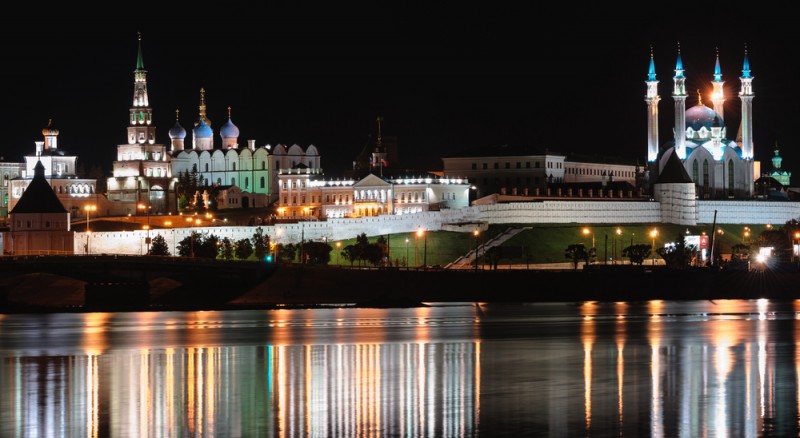
Tatarstan Has Long Had Its Own Foreign Policy
Publication: Eurasia Daily Monitor Volume: 10 Issue: 204
By:

An article intended to discredit Tatarstan and the Tatars by suggesting that radical Islamists have made significant inroads in the Middle Volga has the unintended consequence of calling attention to three things Moscow is reluctant to acknowledge. First, the Kazan Tatars are far more tolerant of Jews and other minorities than most Russians. Second, Moscow was, therefore, unable to deploy Kazan against Israel in Soviet times and cannot effectively mobilize Tatar official opinion now. And finally, Tatarstan has actually had an independent foreign policy since before the collapse of the Union of Soviet Socialist Republics (USSR).
Rais Suleymanov is one of the sharpest critics of Kazan and has long promoted the view that “Wahhabism” is spreading from the North Caucasus to the Middle Volga. But in an article on the webpage of the Volga Center of Regional and Ethno-Religious Research, which he led until recently, Suleymanov unintentionally provides evidence for the opposite of what he claims. Indeed, his evidence actually supports the position of his Kazan Tatar opponents, making their longstanding claims all the more credible (kazan-center.ru/osnovnye-razdely/15/399/).
Suleymanov looks at the attitudes of the Muslims to the Israeli-Palestinian dispute over the past 50 years. He notes that, in Soviet times, Moscow actively used the leaders of the Muslim community of the USSR to promote its anti-Israel position, an exploitation that sometimes led to anti-Jewish actions inside the Muslim republics. But Suleymanov notes that this pattern did not extend to Tatarstan, where the republic’s leadership did not adopt an anti-Israel line and where relations between Tatars and Jews remained good despite the appearance in Kazan of Palestinian students who often played a role in organizing independent and underground mosques.
That pattern remained true after the dissolution of Soviet power, Suleymanov says. Tatars and even Tatar nationalists took pro-Jewish and pro-Israel positions even when Moscow did not. The Tatar Social Center, which was established in 1998, supported the return of synagogues to the Jews of Tatarstan and even set up a Jewish section within its ranks to underscore its opposition to ethnic or religious exclusivity.
According to Suleymanov, “the situation began to change” at the end of the first decade of this century. He says that reflects the work of Arab missionaries, the opening of an Iranian consulate in Kazan in 2007, the growth of religiosity among the Tatars, “the passivity of Israeli diplomacy, and the activity of the Palestinian side, which used the intensification of the role and influence of the Islamic population on the domestic and foreign policies” of the Russian Federation. Another basis of ties between Tatarstan and Israel, he notes, is that there are on the order of 15,000 Tatars living in Israel. They have formed a group, “Tatars for Israel,” which is headed by Zakir Zaripov and which had opened a Tatar Cultural Center.
Suleymanov notes that Iranian efforts to promote anti-Israeli attitudes among Tatars and in the Kazan government have largely failed. Tatars told the Iranian consul general that they were prepared to support Tehran’s pro-Palestinian position only if the Iranian government would provide “generous” subsidies for Tatarstani publications. Moreover, in 2011, a group of Kazan Tatars sought to organize a conference on “The Conception of the Holocaust in the Muslim World” to underscore the disagreement of most Muslims with then-Iranian President Mahmoud Ahmadinejad’s Holocaust denial. Under diplomatic pressure from the Iranian consulate, the Kazan government cancelled that enterprise lest it undermine, in the words of Suleymanov, Kazan’s ties with Tehran. But in June 2012, the republic authorities allowed a conference on Jewish-Muslim relations, which Tehran opposed; and in 2013, they backed the publication of a book by Duma deputy Fatikh Sibagatullina entitled “Tatars and Jews,” which underscored their cooperation.
Suleymanov’s article shows that Tatars and Tatarstan have pursued their own course with regard to Israel since at least 1967. And although he does not mention it, Tatars are very proud of that fact. Last week, Tatars carried placards at a demonstration in Kazan saying that “Tatarstan is a sovereign state and subject of international law, according to [the republic’s] 1992 constitution” (tatar-centr.blogspot.com/2013/11/blog-post_7.html). Russian President Vladimir Putin has contested this but quite clearly without great success.
Tatarstan’s size and importance have made it a regular stop for foreign leaders, especially those from Turkey, the Muslim world, and petroleum exporting countries; and Kazan has exploited that fact. Moreover, it has dispatched its own officials and Muslim leaders to many foreign capitals. And, although it has often done so under the radar screens of other countries, Tatarstan has even sent its own diplomats abroad: One who served in Washington for many years, for example, had a calling card that identified him as a Russian embassy official on one side and which indicated that he was the permanent representative of the Republic of Tatarstan on the other.




